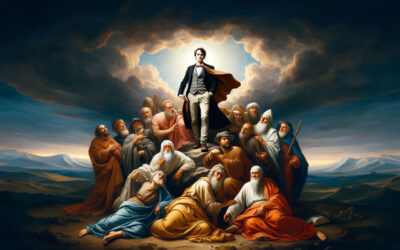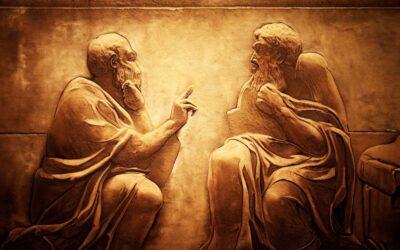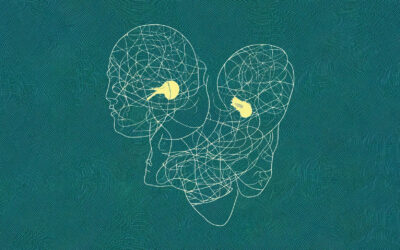In childhood, we build castles with cushions and sticks. We become dashing princes and valiant princesses, we live in a world of imagination and anything seems possible. There is both a wild glory and a fragility to our early years. But as the years pass, reality sets in. Playtime gives way to exams, and exams, in turn, give way to work and mortgage payments. As our years increase so does the cold disappointment of a treadmill of life that numbs our aspirations.
We find we’re no longer content with what’s fantastic but also hunger for the truth. We cast aside our castles in the clouds and look instead for a foundation we can build our lives on. While our minds are often wrapped up in our day to day responsibilities, when our head hits the pillow or tragedy strikes, the deeper questions come rushing back. The questions we ask are a search for the truth about our origin, meaning, morality and destiny. No thinking person ignores this search.
The search for truth
Anthony Hopkins, a self-identified agnostic said: “The only thing I am certain of is that I am certain of nothing.” It’s an interesting thought and makes us all wonder, what do we really know? For example, let’s say we could somehow scale all knowledge: maths, science, philosophy, every aspect of reality. The percentage of all the possible knowledge that you or we know, it may not even be close to one per cent. Given the gap between our finite minds and the infinity to be known, isn’t it arrogant to claim that we know the truth? Even if what we currently know points to a particular truth claim, there is so much out there of what we don’t know which could contradict what we think we know, that we can’t be truly confident about anything. In this view, perhaps all our worldviews are equally valid and justified only in the sense that they are equally invalid and unjustified.
Every generation is confident in their views until the next generation suddenly proves otherwise, because what’s next discovered often reshapes or disregards what we previously reasoned. History displays this pattern in almost every subject. Let’s take science for example, we are starting to realise what was once ignorantly thought relatively simple – light, gravity, matter – is actually turning out to be far more complex. What really is light that allows it to exist as both a particle and a wave simultaneously? Or what about the idea of ‘dark matter’ which is believed to make up about 85% of the universe, very much unknown and yet many of our theories are dependent upon it? Or take the concept of ‘dark energy’, the energy of nothing but not nothing, pushing the universe out. Or what about the mysterious ‘Dark flow’, a distortion where whole clusters of galaxies are flowing mysteriously with no clear cause? To accommodate this mystery we build models of an unseen universe with very little in the way of concrete observations to support them.
As our understanding increases, our scientific models are continually being altered, changed or even rebuilt, and rightly. The more we learn, the more we realise our previous thoughts were often misconceived and no wonder, our human nature is one of limitation, we are finite.
The argument is as follows: Truth is ultimately unknowable until infinite knowledge is obtained, but while infinite knowledge is impossible within human limitation, there can be no certainty in any truth claim.
When we apply this argumentation to the existence of God, we get what’s called agnosticism. To be an agnostic is to believe that the existence of God is not and cannot be known. Because of human limitation, there can be no known objective reality.
Doubting doubt
Why then, may I ask, do we find in mankind a deep desire to obtain truth with the faith that it is attainable? No one sets out on a journey unless they hope to reach a destination. In the same way, every intellectual endeavour is dependent on this faith. Otherwise, we are just “always learning but never able to come to the knowledge of the truth.” And if this is the case, then every intellect is a fool, for he or she sets out to find an answer which can never truly be obtained. The journey may be enjoyable, but it is vanity at best.
Contrary to agnosticism, we all live affirming the existence of absolutes. We live as though we all have a duty to uphold a ‘moral’ lifestyle. We assume that actions such as rape and murder are definitely wrong. We fear those who do not live with an apparent sense of this moral duty. We believe life has a value which we ought to honour and protect and we arrest those who act contrary to this. We tend to live as if love is an absolute truth for our lives. So what does this make of us, if we proclaim that objective truths are not attainable while assuming objective truths in our way of life in order to survive as a civil society? It makes us deluded.
This leads us to the conclusion that if the ultimate reality behind the universe is a personal God, this has far-reaching implications to the human search for truth because the only way to truly know something is if the truth is verified by one with infinite knowledge, infinite understanding: the mind of God. Someone who holds the entire universe within His circle of knowledge. If a God like that revealed certain absolutes, specific truth claims could be reliably made. In this view, the thirst for knowledge is therefore not vanity at all, besides, “It is God’s privilege to conceal things and the king’s privilege to discover them.” (Proverbs 25:2) Our finite nature means that there will always be gaps in our knowledge which only omniscience can fill, but God has put enough content in the world to satisfy any honest intent to find God. So I am only left to finish as king Solomon started in the book of proverbs where it reads – “The fear of the Lord is the beginning of knowledge.” As bold as it may seem, without this recognition of God, the pursuit of truth will always truly be vanity.



